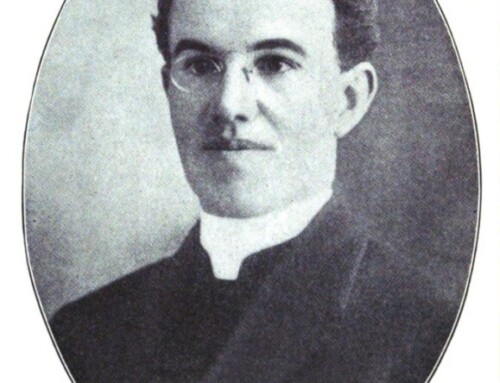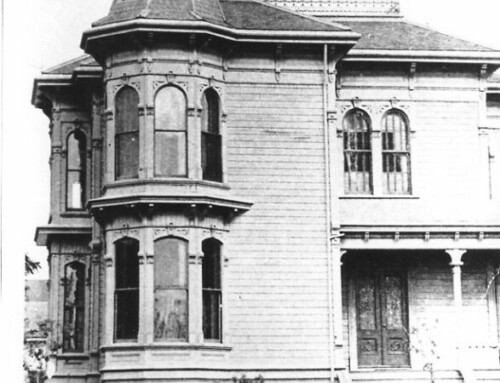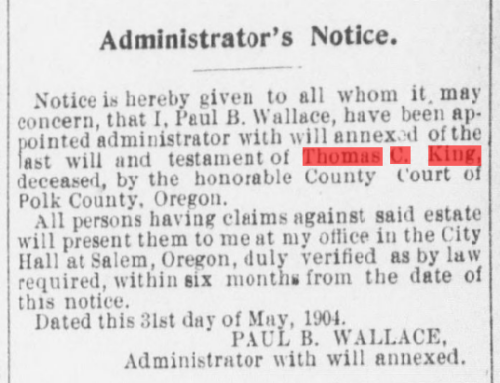By Richard van Pelt, WWI Correspondent
The Protagonists: Austria-Hungary & Serbia
“The tragedy that has befallen the ill-fated house of Hapsburg, according to news reaching London, was the result of a carefully prepared Serbian nationalist plot in revenge for the annexation of Bosnia and Herzegovina, which defeated the dreams and aspirations of creating a greater Serbia.” The paper reported that the assassins “confessed that the plot was matured at Belgrade. The terrible event is only another illustration of how well justified is the anxiety always present in the minds of European politiciansand diplomatists against the unstable conditions prevailing in the Balkans and even in the dual monarch itself.” (The Oregon Statesman June 30, 1914)
The 1900 census for Marion County lists 264 residents who were either born in Austria or whose parents were born in Austria. The census lists 215 residents who were born in Hungary. No Serbians resided in Marion County.

From Wikipedia
Austria-Hungary, the weakest of the European powers, lived in fear of ethnic conflict, consisting as it did of a population adhering to five major religions and at least a dozen languages.
The assassination occurred in Sarajevo, a provincial capital of Bosnia-Herzegovina, which Austria had seized from the Ottoman Empire in 1878 and annexed in 1908. Serbia, which obtained its independence from the Ottomans after centuries of conflict, contested Austria over Bosnia in its efforts to create incorporate all Serbians under one flag. Serbians residing outside of Serbia saw the Dual Monarchy as simply another oppressor, stepping in to take over from the retreating Ottoman Turks.
The assassins were all Austrian subjects, but they had been armed in Serbia by a Serbian nationalist organization which sought to oppose Bosnia’s incorporation into Austria. Austrian investigations led to the Black Hand, a terrorist organization whose aim was the unification of all Serbians, and which administered a death oath to those who joined the organization. Austria blamed the assassination on the Serbian government, though the exact degree to which Serbian authorities may have known of or encouraged the assassination is not known.
Margaret MacMillan in “The War That Ended Peace” describes the assassins in terms familiar to our own times:
The act which was going to send Europe on the final leg of its journey towards the Great War was the work of fanatical Slav nationalists, the Young Bosnians, and their shadowy backers in Serbia. The assassins themselves and their immediate circle were mostly young Serb and Croat peasant boys who had left the countryside to study and work in the towns and cities of the Dual Monarchy and Serbia. While they had put on suits in place of their traditional dress and condemned the conservatism of their elders, they nevertheless found much in the modern world bewildering and disturbing. It is hard not to compare them to the extreme groups among Islamic fundamentalists such as Al Qaeda a century later. Like those later fanatics, the Young Bosnians were usually fiercely puritanical, despising such things as alcohol and sexual intercourse. . . . They were idealistic, and passionately committed to liberating Bosnia from foreign rule and to building a new and fair world. Strongly influenced by the great Russian revolutionaries and anarchists, the Young Bosnians believed that they could only achieve their goals through violence and,m if necessary, the sacrifice of their own lives.
The assassin, Prinzip, was quickly brought to trial and the October 29th, 1914 Oregon Statesman reported the judgment as follows:
Prinzip Is Sentenced
Assassin of Archduke Ferdinand
Gets Twenty YearsSarajevo, Bosnia, Oct. 28.. . . Judgment was passed today on the assassination of Archduke Francis Ferdinand, heir apparent to the Austro-Hungarian throne, and his wife.
Prinzip, the actual assassin, escaped with a sentence to imprisonment for twenty years. Four of the conspirators were sentenced to death by hanging, one to life imprisonment, two, including Medeljo Gabrinvio, who threw a bomb at the archduke, but which did not explode, to twenty years, one to sixteen years, one to thirteen years, two to ten years, one to seven years, and two to three years.
The other defendants were acquitted.
At trial in Sarajevo (then part of Bosnia), Gavrilo Princip, his co-conspirators, and sixteen others were tried before a panel of three judges. Princip, nineteen, was sentenced to twenty years in prison. At the time of his sentencing he was 27 days shy of his twentieth birthday, and thus too young to receive the death penalty.
At his trial, when asked of his guilt, Princip replied that “I am not a criminal, because I destroyed that which was evil. I think that I am good.”

Gavrilo Princip Captured. Source: Wikimedia Commons.
Princip, replying to questioning regarding his politics responded that “I am a Yugoslav nationalist and I believe in the unification of all South Slavs in whatever form of state and that it be free of Austria.”
Asked how he sought to realize his aspiration, Princip replied, “By means of terror.”
“What does that signify?” asked the Prosecutor. Terror, Princip responded “means in general to destroy from above, to do away with those who obstruct and do evil, who stand in the way of the idea of unification.”
There are similarities between the assassination of the Archduke and the events of 9-11. In both instances forces within the governments sought to use the event to remove foreign policy thorns – in 1914, the thorn was Serbia. Austria demanded satisfaction from Serbia, conditions which Serbia was unwilling to make. The Serbian government denied any complicity with the conspirators. Whether the Serbian government was aware of the conspiracy is unknown, though the head of Serbian intelligence was actively involved.
Published in Special Edition of Official Gazette, Vienna, July 28.
The Royal Government of Servia not having given a satisfactory reply to the note presented to it by the Austro-Hungarian Minister in Belgrade on July 23, 1914, the Imperial and Royal Government of Austria-Hungary finds it necessary itself to safeguard its rights and interests and to have recourse for this purpose to force of arms. Austria-Hungary, therefore, considers itself from this moment in a state of war with Servia.
Count Berchtold, Foreign Minister for Austria-Hungary described how war become necessary:
Austria-Hungary looks upon this war as a purely defensive one, which has been forced on her by the agitation directed by Russia against her very existence. Austria-Hungary has given many proofs in late years of her peaceful intention. She refrained from any interference with arms in the Balkan war, though her interests were at stake. Subsequent events have proved what a serious danger the increase in territory and prestige which it brought Servia were for Austria-Hungary. Servia’s ambitions have since grown and have been solely directed against the Dual Monarchy. Russia has tacitly approved of Servia’s action because Russian statesmen wish to form an iron ring of enemies around Austria-Hungary and Germany in order that Russia’s grasp on Constantinople and on Asia should never again be meddled with. Austro-Hungarian soldiers are fighting for their homes and for the maintenance of their country, the Russians are fighting to help the Russian Czar to gain the rule of the world, to destroy all his neighbors who may be dangerous to Russian ambitions. England is helping the Russians to oust her German rival. She feared for some time that German culture and German scientific methods would prove the stronger in a peaceful competition, and she now hopes to crush Germany with the help of Russia and France. And France is fighting to win back Alsace-Lorraine, to take her revenge on Germany, which the French nation has been aiming at for the last forty-four years.
That is how Austria-Hungary looks upon the war. She never wished for territorial increase, she wished for peace and that her people should develop in safety.
Germany equally had nothing to gain by a war, but Germany knows that Austria-Hungary’s enemies are her enemies and that the dismemberment of the Hapsburg monarchy would mean the isolation of the German Empire.
And so, after all efforts to keep Russia and England from breaking the peace of Europe had failed, she drew her sword to defend her and her allies’ interests.
Truth and honor are on the side of the two empires in this war, the unspeakable inventions and prevarications published by the French, Russian, and English press in the last weeks alone must prove to the American people who can afford to tell the truth and nothing but the truth in this war.
The Austro-Hungarian and German people have a clear conscience and need fear no misrepresentation of their action.
That one part of government would not know what another ministry was doing is a common theme among all of the belligerents. The French foreign ministry would keep the President of France and the French Assembly in the dark; French ambassadors would keep vital information from even the foreign minister. The German army would make plans without telling the Navy or the Reichstag. In Russia, the story was the same; the ambassador to Belgrade would operate at cross-purposes with the ambassador to Sofia. The Russian foreign minister suggested to Austria that it annex Bosnia, even though Russia treated Serbia as a client state.
No power could operate on the foreign stage without the support of allies. Austria’s pressure on Serbia depended upon support by Germany. Russia was the primary ally and supporter of Serbia. Russia’s ability to act in the Balkans depended upon support by Great Britain and France. A network of alliances and treaties and secret protocols linked nations together and eventually dragged them all into a war that no one expected to occur. Few foresaw a world war emerging from the assassination of the archduke.
But war did emerge, and whether Europe stumbled or sleepwalked into war the scope and scale of the war eventually dragged in the United States and Marion County.
The Protagonists – Germany

Kaiser Wilhelm II. Source: Wikimedia Commons.
In a speech to the Reichstag, the German emperor, Wilhelm II, set out why Germany entered the war on the side of her “high ally” the Dual Monarchy of Austria-Hungary:
It is in an hour fraught with fate that I have assembled about me all the representatives of the German people. For almost half a century we have been able to keep to the path of peace. The attempts to attribute a warlike temperament to Germany and to circumscribe its position in the world have often put to severe tests the patience of our people. With unswerving honesty, my Government, even in provoking circumstances, has pursued as its highest aim the development of all moral, spiritual, and economic powers. The world has been witness how tirelessly we strove in the first rank during the pressure and confusion of the last few years to spare the nations of Europe a war between the great powers.
The very grave dangers which had arisen owing to the events in the Balkans appeared to have been overcome, but then the murder of my friend, the Archduke Francis Ferdinand, opened up a great abyss. My high ally, the Emperor and King Francis Joseph, was compelled to take up arms to defend the security of his empire against dangerous intrigues from a neighboring State. In the pursuit of her proper interests the Dual Monarchy has found her path obstructed by the Russian Empire. Not only our duty as an ally calls us to the side of Austria-Hungary, but on us falls also the mighty task of defending the ancient community of culture of the two kingdoms and our own position in the world against the attack of hostile powers. With a heavy heart I have been compelled to mobilize my army against a neighbor with whom it has fought side by side on so many fields of battle. With sincere sorrow I saw a friendship broken of which Germany had given faithful proofs. The Imperial Russian Government, yielding to the pressure of an insatiable nationalism, has taken sides with a State which by encouraging criminal attacks has brought on the evil of this war. That France, also, placed herself on the side of our enemies could not surprise us. Too often have our efforts to arrive at friendlier relations with the French Republic come in collision with old hopes and ancient malice.







We received an interesting note about the photo published above of Princip:
From Centenary News (http://www.centenarynews.com/article?id=1672):
Innocent bystander
In one of the Sarajevo archives, for example, it is possible to find the original of the `Princip arrest’ photograph correctly captioned with the name of the person being bundled away.
He was an innocent bystander, a man called Ferdinand Behr, an inhabitant of Sarajevo, who was picked up by the police simply because he tried to stop a mob on the pavement from beating Princip to death.
He published an account of the arrest in 1935 after seeing himself in a picture repeatedly captioned in error as Gavrilo Princip. He expressed his surprise that the mistake was made as he was so much taller and broader than the famously short and wiry Princip.
Yes. That is correct. I did not include that otherwise famous photograph for that reason. Just another example, I guess, on how mistakes live on.
Readers might be interested in the attached podcast:
http://podcasts.ox.ac.uk/sandwich-sabotaged-civilisation
I had considered addressing this issue. Here is what I wrote originally:
“The Capital Journal Headline for the 29th of June, 1914 reported the assassination of the Archduke Francis Ferdinand in Sarajevo, Serbia. The event is burned into our memory as the act that triggered World War I. The photograph above purports to show the capture of the the assassin, Gavrilo Princip.
“This iconic photograph and the many memories of the war – an auto that makes a wrong turn, the assassin having a sandwich when the auto appears before him implying a chance encounter that changed history – is not true.
“What this image does is to contest the tension between memory and history. What we think we see shapes what we think we know about the past, even if what we remember seeing is not in fact factual.”
I did not include it because the text represented someone else’s research. At some point it might make for a posting of its own.